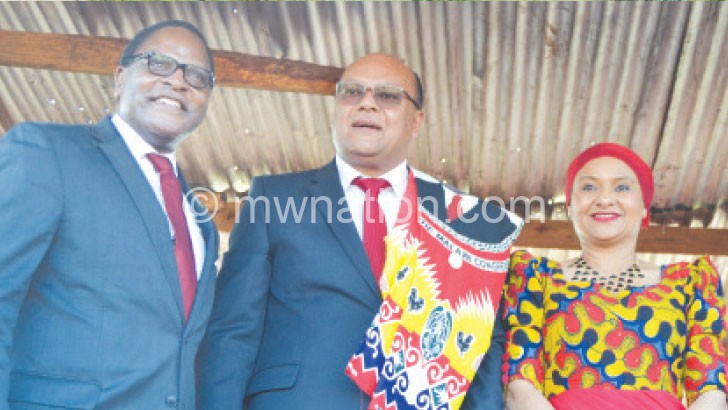Party loyalists, family in Cabinet
A family man. That was how President Lazarus Chakwera was described after appointing his first Cabinet when he assumed office following his triumph in the June 23 court-sanctioned fresh presidential election.
The Cabinet announced on July 8 2020, surprised some, as the President took on board family members as well as some Malawi Congress Party (MCP) loyalists.
A few members of the UTM Party, which is one of the key partners in the nine-party Tonse Alliance administration, as expected were also taken on board.
But what raised eyebrows, was the appointment of Mohammed Sidik Mia, his runningmate in the nullified May 2019 presidential election as Minister of Transport and Public Works and his wife, Abida, as Deputy Minister of Lands.

Not only that, two family members related to former president Kamuzu Banda, Ken Kandodo and his sister Khumbize Chiponda, made it into the Cabinet as Minister of Labour and Minister of Health respectively.
Again, the Central Region, his home base, dominated with at least 20 seats in the 31-member Cabinet. And MCP loyalists were rewarded with Lobin Lowe, the former Leader of Opposition landing the Ministry of Agriculture, Lingson Belekanyama appointed Minister of Local Government and Rural Development while Chakwera’s blue-eyed boy Eisenhower Mkaka, who is also the party’s secretary general, was appointed Minister of Foreign Affairs.
There was more joy in MCP as other party loyalists such as Sosten Gwengwe was appointed Minister of Trade and Nancy Tembo was handed Forestry and Natural Resources portfolio.
But UTM Party suffered although as expected the party’s president and the country’s Vice-President Saulos Chilima landed the Economic Development and Planning portfolio as well as a role to lead the public reforms programme.
His running mate in the May 2019 poll, Michael Usi, was appointed Minister of Tourism while the party’s secretary general Patricia Kaliati became Minister of Gender, Community Development and Social Welfare.
Newton Kambala, another UTM member, was appointed Minister of Energy, Nancy Mdooko was appointed Deputy Minister of Transport and Public Works, Chrissie Kanyasho became Deputy Minister of Health while Agnes NyaLonje got the Education portfolio. That’s it.
Our analysis shows the Cabinet has 16 MCP members of whom 12 are full ministers and four are deputies, representing 51.6 percent while UTM Party has six members comprising four ministers and two deputies, representing 19.4 percent.
Chakwera, who promised to have 40 percent women representation and no more than 30 members in his Cabinet, missed his target having appointed 12 female ministers, representing 38 percent.
Out of that number, only four females are full ministers. These appointments did not go down well with gender advocates, who described it as a raw deal.
Gender activist Emma Kaliya said: “We are deflated that the President has not lived up to the promise of 40 percent female representation. What is even more saddening is that most women are deputy ministers. Why is this the case? The President raised our expectations, but his appointments are less inspiring.”
Human Rights Defenders Coalition (HRDC) also expressed their dissatisfaction with the appointments, saying the Cabinet did not meet the principle of inclusivity which the Tonse Alliance administration sold to the electorate.
HRDC leader Gift Trapence in July since asked Chakwera to reconstitute the Cabinet to meet the aspirations of the people.
The leadership of HRDC also engaged Chakwera in Lilongwe for an hour following concerns that the appointments smacked of nepotism and cronyism.
The President speaking in an interview with BBC’s Focus on Africa, defended the Cabinet appointments.
He, however, acknowledged public grievances over some appointments and pledged to review the Cabinet after a five-month transition period.
He said: “When I came up with the list of names, marital status was not even an issue, religion was not even an issue and these other issues that people are raising were never considered. We just wanted to look at merit.”
But governance expert Henry Chingaipe said the Cabinet was a crisis of expectation “as it did not resonate with the expectations of a majority of Malawians who felt it was less inspiring in view of the governance and development agenda that had been set.”
Now that six months have elapsed, will those that made it into the botched Cabinet survive the probation period?





